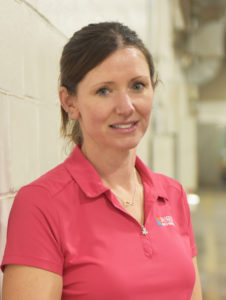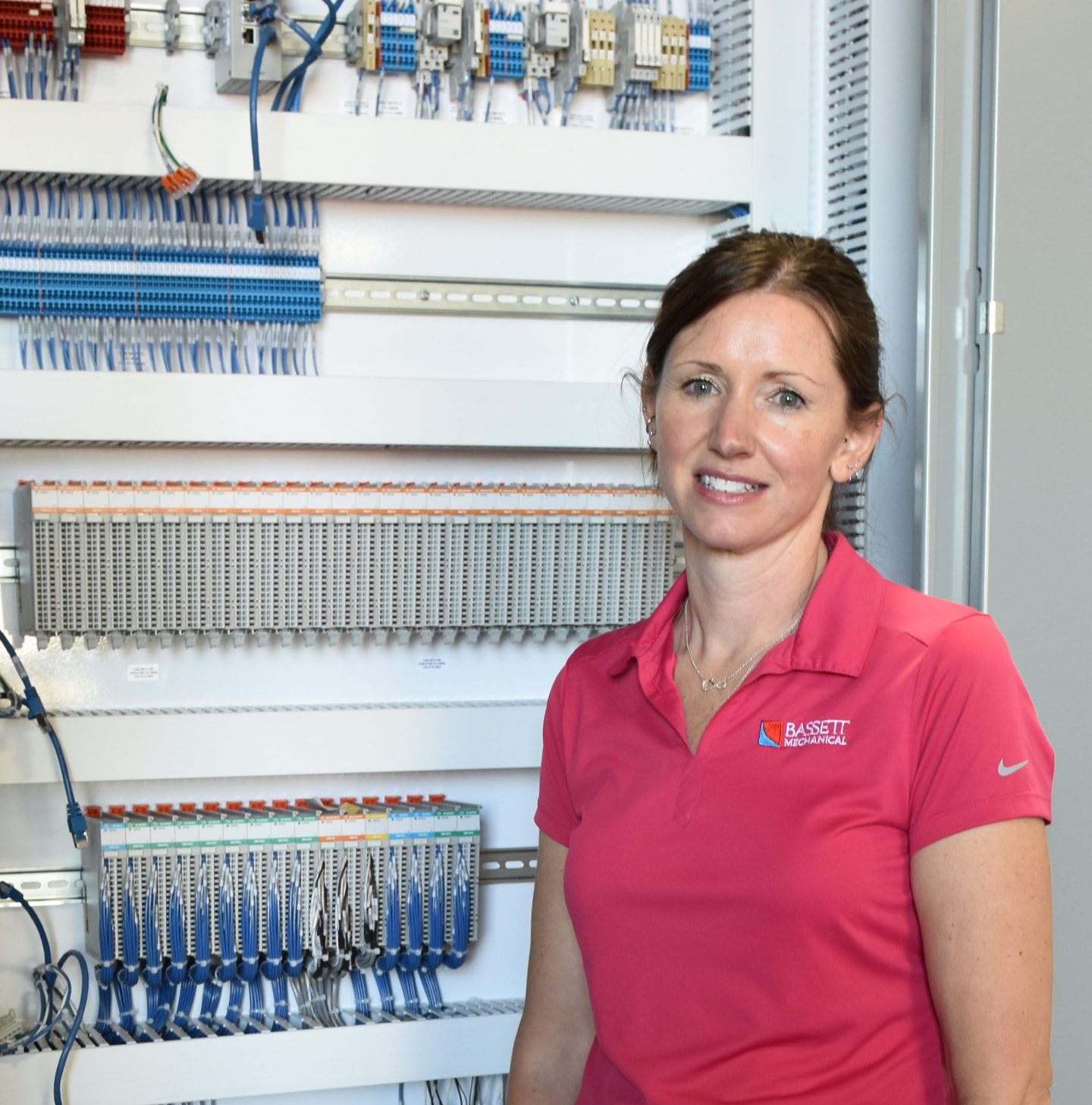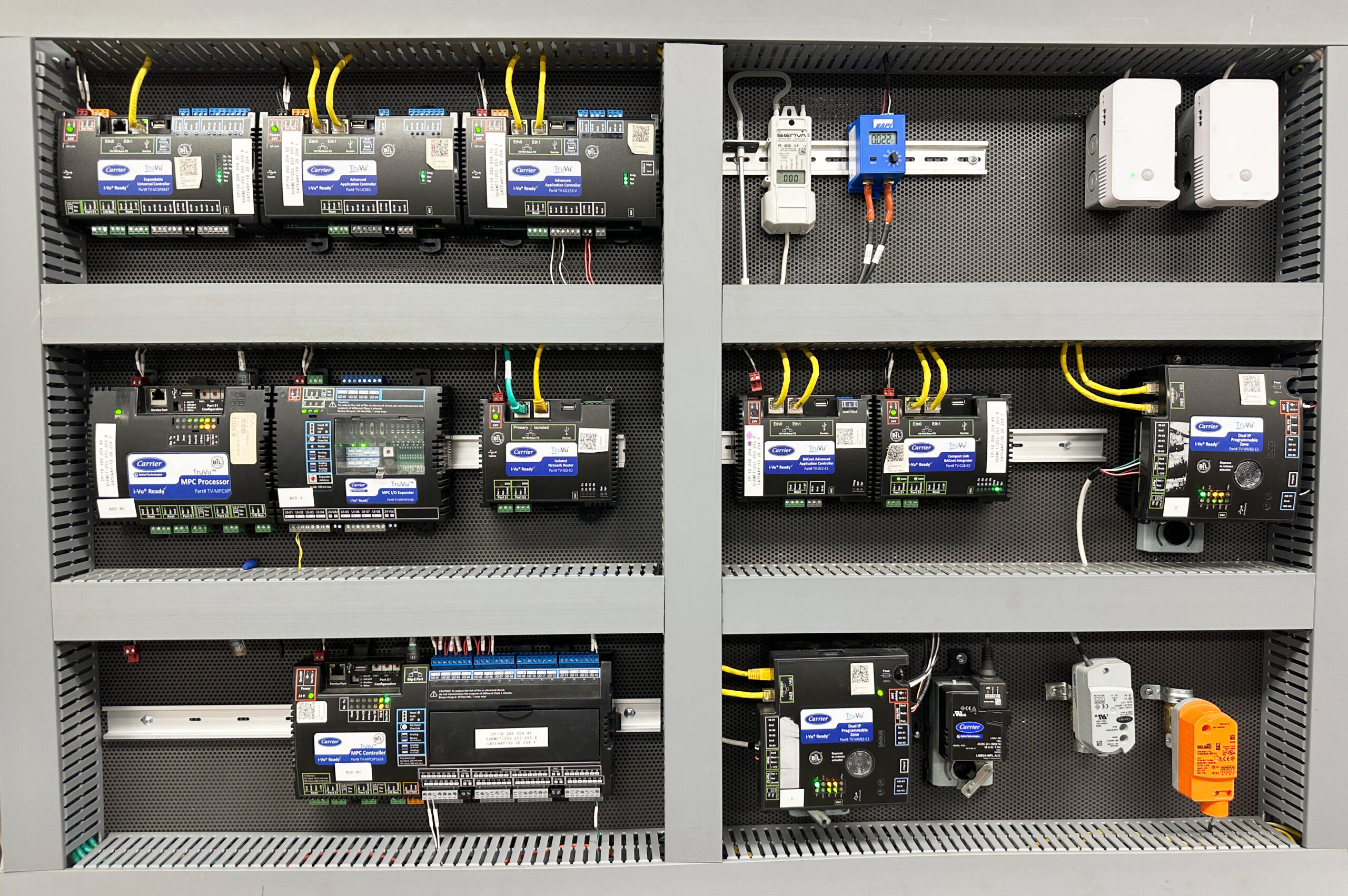Whether you’re a young girl in middle school or a woman in her 40’s it’s always the right time to start exploring a career in science, technology, engineering or math (STEM).

STEM occupations account for nearly 7% of all U.S. occupations and STEM workers play an important role in America’s innovative capacity and global competitiveness. These occupations include engineers, medical scientists, sociologists, and informational security analysts. Women make up only 28% of the workforce in STEM careers.
Stacey Gwidt, PLC/HVAC Controls Specialist at Bassett Mechanical, found her expertise and passion for automation and controls after years in a different field. One night while working her second shift job as a custodian at an area school, she decided that it was time to make a career change. She enrolled at Northeast Wisconsin Technical College (NWTC) and started her journey to an automation and controls career.
We sat down with Stacey to talk about her journey and what we can do to encourage young women to get involved in STEM careers.
Q: You studied Automation Engineering Technology at NWTC. Can you tell us more about automation engineering technology and what sparked your interest in a STEM career?
A: Automation engineering uses technology to improve and automate a manufacturing process. You could be focused on conveyor belts or even robots.
I was first interested in this field after I went to NWTC to talk with the faculty and tour the facility. I was very fascinated by their Engineering Technology Hall. I started with the Electromechanical Technology courses. It was heavy on automation classes, and I loved them! I picked up the Automation Engineering Technology degree during my third semester. I graduated with both degrees.
Q: What was the most challenging part of your college experience? Did you ever experience any uncertainty that this was the path for you?
A: Not enough time was a big challenge for me as a non-traditional student. I went to school full-time during the day, work full-time second shift, and have two young girls. I experienced a little bit of uncertainty at first but the more I learned about it the more I was fascinated by it. I focused on the result of obtaining my degree and getting a job in the field.
Q: How were you encouraged to get into a STEM career?
A: I grew up with two brothers and my dad has his own business in construction, so I was always around the trades. My older brother is also a Mechanical Engineer. I enjoyed math and science and liked to work with my hands. Even though it took me several years to take the leap into this career path, it was always in the back of my mind as an option.
Q: Describe your role as a PLC/HVAC Controls specialist at Bassett Mechanical. What does an average day look like for you? What are you looking forward to in this new role?
A: Right now, since I’m new, most of my days are spent learning! My job overall is to work with the controls team and engineers to assist in programming, design, coordination, wiring, and other installation of projects. I also need to keep up to date on the latest technologies in HVAC, Programmable Logic Controllers (PLC’s), Human Machine Interface (HMI’s), and Supervisory Control and Data Acquisition (SCADA). In addition, I travel to customer sites to do system checkouts and troubleshooting, if needed.
Q: What’s your favorite part about your job?
A: My favorite part about the job is that I’m constantly learning, and every day is different and challenges me to be better.
Q: If you could be part of any project in the world, what would it be?
A: Working on something at Lambeau Field.
Q: What are the biggest misconceptions people have about automation/controls/engineering/STEM careers?
A: It’s more than just the office. Every day is different. One day you could be onsite for a startup and programming, the next day you could be meeting with a customer on a future project. Everything we do in controls is customized so no two systems are the same, making every day exciting and challenging!
Q: What are some ways that we can expose more women to the opportunities in this field? What do you think we can do, not just as a company, but as a society to encourage women?
A: More awareness and earlier exposure to the different career options is a must! We need to get young girls more hands-on experience. In many of my recent classes, I was the only woman there, so I think that signals that we still aren’t doing enough.
In a world that is fast becoming more technologically advanced, STEM education matters much more than it did 20 years ago. Hopefully, schools will continue to focus on educational initiatives that are driving STEM education and training.
Q: What is some relevant coursework inspiring students should take?
A: Math and sciences are the most important to focus on like calculus and physics.
Q: What kinds of practical experience or technical skills should students work toward?
A: Be able to picture how things should work. It’s helpful to know what the end results are that you’re looking for. It’s also important to have good attention to detail and problem-solving skills.
Q: What are your hopes for the future of STEM careers?
A: I hope as a society and industry we encourage more people especially women to get involved in STEM careers and give them the tools and direction they need to be successful in the field.
Q: Any final advice you would give to girls thinking about studying a field in STEM?
A: Go for it. Nothing can stop you if you’re interested. Keep letting that drive you. It’s a very fulfilling career.
National STEM/STEAM Day is celebrated every year on November 8th to encourage kids to explore their interests in the fields of science, technology, engineering, art, and math.
As more women choose to pursue degrees in and enter the field, we’d love for them to become part of our Bassett Mechanical Family. Learn more about our current opportunities here!




